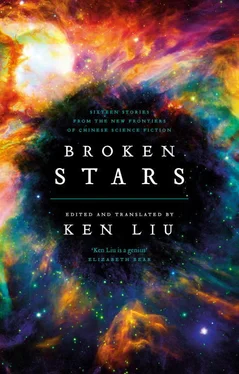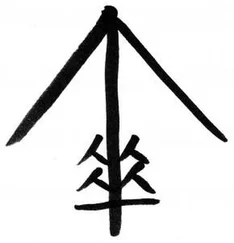“Ah Chen lived alone after that, in the constant clash and torment of the powers in his head. You can’t go back on a bargain, no matter how much you regret it. He sporadically wrote many bestsellers, won many awards, but he never remarried, never moved out of the house, and never read his own works. The books piled up in the corner of his study and gathered dust.”
So her father was a science fiction author. Mo looked at him, her brow furrowed. How do you know all this? How do you know a version of yourself from another universe? How many things are you hiding from me?
The cooking box dinged. It was a bowl of Laba porridge.
Maybe it was just the chill from a snowy night, but when her father carried the porridge past her, it seemed to tinge the air with the cool, faint smell of salt.
At the other end of the restaurant, Ah Chen lifted his head. He saw the owner’s long, thin face, and his eyes widened.
They conversed.
Mo hurried over to eavesdrop, but heard only their last words: “All laws are one; all things are eternal.” She couldn’t help but feel disappointed.
Her father turned and made his way back to the kitchen, leaving Ah Chen sitting stunned at the table. His gaze followed her father’s retreating back for a while, then slowly shifted back.
Gradually, a small smile surfaced on his face. There was a hint of desolation in it, as if he were reliving some memory.
In front of him was the bowl of deep reddish-violet Laba porridge, in which black glutinous rice, kidney beans, adzuki beans, peanuts, longan, jujubes, lotus seeds, and walnuts had been cooked until they’d turned slippery and soft, squeezed together like a family. The cool, faint smell of salt wafted from the bowl.
Ah Chen sat like that until the other guests had left one by one. The porridge had finally cooled.
He got up slowly. Mo hurried to open the door for him.
The smile was like the transient flash of a sparkler in the night sky. His eyes were empty again.
Without a glance for Mo, Ah Chen disappeared into the wind and snow.
The clock struck midnight; a gust of cold wind blew in, carrying powdery snow with it.
“Don’t you want to know what we talked about?” her father asked slowly as he wiped a plate dry.
“Yeah!” Mo thought of the look in Ah Chen’s eyes and shivered despite herself.
“I told him that, a few days later, a certain book will win an award on Earth. It tells the story of a woman’s undying love for a man, and the author’s name is Zhang Ci. Ah Chen wrote the book based on Ci’s diary. I fear it’s the last and only work he can write in this lifetime that will give him satisfaction.”
Ma Boyong is a prolific and popular fiction writer, essayist, lecturer, Internet commentator, and blogger. His work crosses the boundaries of alternative history, historical fiction, wuxia (martial arts fantasy), fabulism, and more “core” elements of science fiction and fantasy.
Incisive, funny, and erudite, Ma’s works are deeply allusive, featuring surprising and entertaining juxtapositions of traditional elements from Chinese culture and history against contemporary references. The ease with which Ma marshals his encyclopedic knowledge of Chinese history and traditions also makes it a challenge to translate his most interesting works. For example, he has written a thriller set in Tang Dynasty Chang’an that employs the pacing and tropes of a modern American TV show like 24 , as well as two wuxia novellas featuring Joan of Arc, in which the tropes and expectations of wuxia are mapped to Medieval Europe. These stories are extremely entertaining for the reader with the right cultural context and shed new light on the genres and sources Ma plays with, but would be nigh-impenetrable for a reader in translation without extensive footnotes.
“The First Emperor’s Games” starts off with the absurd premise that Qin Shihuang, China’s First Emperor, was an avid computer gamer. Once that premise is swallowed, the mapping of Classical Chinese philosophy onto modern video games is wondrous. However, much of the humor of the story depends on knowledge of Chinese Internet culture and ancient Chinese history, so liberal use of Wikipedia may be necessary for some readers.
More of Ma Boyong’s work may be found in Invisible Planets .
THE FIRST EMPEROR’S GAMES
From his magnificent throne in the capital, the First Emperor, Qin Shihuang, issued a new edict: “Now that China has been united, I want to play some games!”
The emperor deserved a break. After conquering the other six states, the Qin Empire had successfully carried out multiple complicated reforms: getting everyone to write in the same script, regrading all roads to be the same width, standardizing units of measurement, and promulgating an all-encompassing encoding for all computer text that subsumed the incompatible encodings used by the former warring states. With this Uni-Code in place, citizens of the Qin Empire could confidently launch any program without worrying about conversion plug-ins or screens filled with random glyphs. Moreover, he had constructed a Great Firewall up north, which shielded the empire from all barbarian attacks as well as pop-up ads.
These tasks had taken up decades of the emperor’s youth. With the world at peace, he needed to take a long, relaxing vacation and play some games, just like any ordinary citizen.
The news that the emperor was in search of quality games soon spread throughout the land and became the talk of every teahouse and tavern. Most greeted the news with joy because a good gamer made a good administrator. It was said that Zhang Yi, the great Qin strategist who had furthered the emperor’s ambition by sowing discord and suspicion among the other six states, thereby dissolving their anti-Qin “vertical alliance,” had adapted his line-breaking strategy from Candy Crush— swipe, match, gone! Back when Zhang had been a student, he had devoted all his free time to playing games instead of studying. Yet, look how far he had risen! Obviously, playing games taught important management skills.
However, a few nobles expressed reservations. They thought of games as addictive, cheap entertainment suitable only for plebeians. A great leader like the emperor should stay as far away from them as possible. Their suggestion for curing the emperor of this “electronic opium addiction” was electroshock therapy. The emperor soon declared the nobles guilty of attempted treason and sentenced them to capital punishment.
But the news generated the most excitement among the contending philosophers and scholars of the Hundred Schools of Thought. These wonks, obsessed with putting their ideas for better government into practice, understood the weighty implications right away. As the head of such an extensive empire, the emperor’s choice of games would inevitably affect his governing philosophy, and that meant a great opportunity for the scholars to persuade the policymaker under the guise of entertainment. Should the emperor become enamored by a philosopher’s game, it was likely that the emperor would push for policies evolving society in the direction of the philosopher’s sagacious ideas.
Soon, the capital was filled with representatives from philosophy start-ups and development think tanks. They lined up before the palace with demos of their best games, hoping to impress the emperor.
The first to make a presentation was the Legalist school of thought. To be sure, the Legalists had an unfair advantage because their leader, Li Si, was also Chancellor of the Qin Empire. The day after the emperor issued his edict, Chancellor Li approached the throne, a DVD in hand.
Читать дальше












